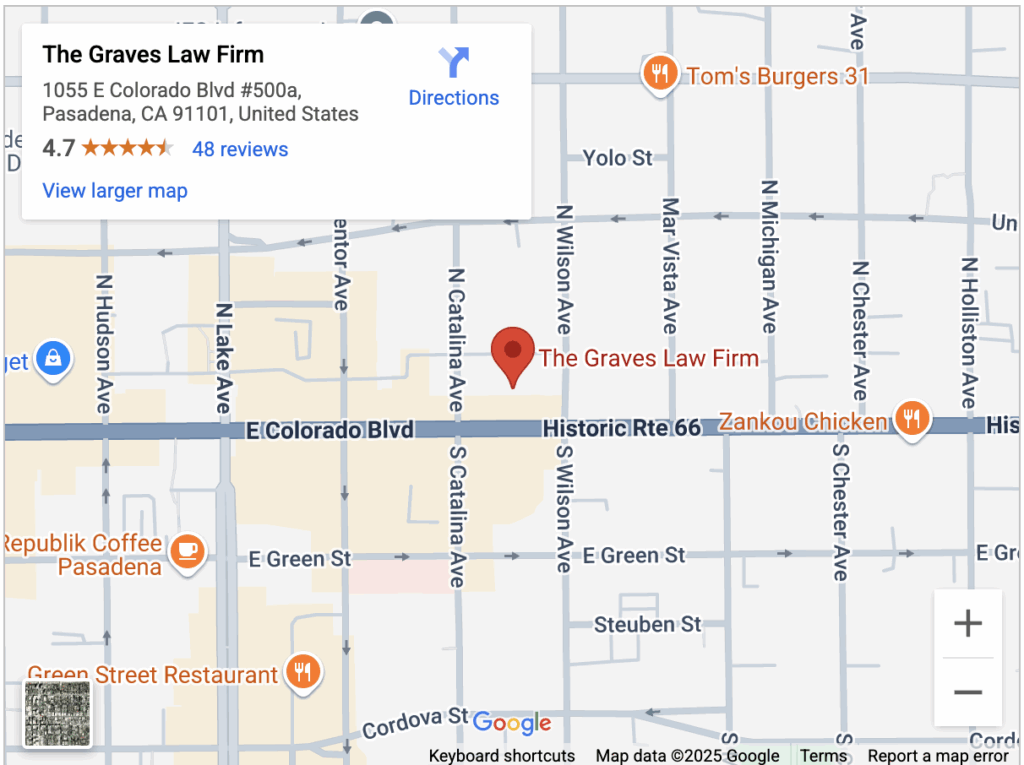
Are you having issues with spousal support in Pasadena, CA? The Graves Law Firm can help. Let our skilled Pasadena spousal support lawyers protect your interests. Contact us online or call our law office at (626) 365-1037 for a confidential consultation. We’re here to assist you 24/7.
Spousal support in California is not automatic. If you’re going through a divorce, it’s essential to have an experienced lawyer by your side to provide compassionate legal support for you and your family. For over 20 years, our team has helped countless families navigate the complexities of spousal support and other similar matters. Let us advocate for your rights and secure the best possible outcome for you.
How The Graves Law Firm Can Help Me With Spousal Support Issues in Pasadena, California

Spousal support is a complicated area of law in Pasadena, California. Alimony can provide critical support after a divorce. It can also create a huge burden for the spouse who is ordered to pay. If you’re dealing with spousal support issues, you deserve to have an experienced Pasadena family lawyer to represent you.
Our team at The Graves Law Firm is committed to providing personal support throughout the divorce process. We’re passionate about protecting our clients’ interests, and that shows in our work. Our founding attorney is a board-certified family law specialist who has been recognized by California Super Lawyers and various other organizations for her exceptional skills.
When you hire us, you gain a team to:
- Offer strong legal guidance throughout the legal process
- Identify options and workable solutions
- Facilitate mediation and negotiation to resolve complex and contested issues
- Locate and present strong evidence about income, lifestyle, spousal contributions, and the standard of living you enjoyed during the marriage
- Represent you skillfully at all hearings and at trial if necessary
We’re always here to discuss your case. Call our Pasadena divorce attorneys for a consultation today.
Overview of California Spousal Support Rules
Courts in California have the authority to award alimony or spousal support. Two spouses can also reach an independent agreement on spousal support and have that agreement incorporated into their divorce settlement.
Spousal support is awarded to maintain fairness in each spouse’s financial position after a divorce. The law recognizes that each spouse may have contributed to the marriage in different ways. While one spouse may have focused on advancing their career, the other may have focused on keeping the household running.
Spousal support is not a right in California. Family law judges have wide discretion when determining spousal support.
What Types of Spousal Support Exist in California?
Several different types of spousal support exist. Our attorneys in Pasadena have the skills to handle any spousal support issue, including those involving:
Temporary Spousal Support Awards
Sometimes, one spouse requires support while divorce proceedings are pending. Judges can offer temporary relief before all relevant issues have been resolved. The judge will consider the requesting spouse’s needs and the higher-income spouse’s ability to pay.
Temporary spousal support ends once the divorce has been finalized.
Permanent Spousal Support Awards
After a divorce has been finalized and the division of assets is complete, the judge can order one spouse to continue paying alimony. Permanent spousal support orders aren’t always permanent, despite the name.
Indefinite spousal support is typically available only in cases where:
- It’s unlikely that the requesting spouse could become self-supporting.
- The marriage was a long-term marriage.
In California, a presumption exists that a marriage is “long-term” if it lasts at least ten years. For marriages that last for less than ten years, spousal support generally lasts for half the length of the marriage.
Long-term spousal support often ends when the receiving spouse becomes self-sufficient or remarries.
Lump Sum Spousal Support Awards
A couple can agree to a lump sum arrangement in lieu of continuing payments. Lump sum spousal support payments allow each spouse to move forward with their lives without ongoing connection.
What Are Reimbursement Spousal Support Payments?
Reimbursement payments really aren’t alimony. They’re similar to alimony in that they are awarded to recognize each spouse’s contributions to the marriage. Courts can order one spouse to repay the other for contributions to their education or career. Reimbursement alimony is typically part of the property settlement agreement.
How Are Spousal Support Payments Calculated in Pasadena?
There is no fixed calculator for calculating spousal support payments. Courts have far more discretion in ordering spousal support than in child support.
Judges consider a range of factors when awarding spousal support. The factors that are considered in calculating alimony are referred to as “4320 factors.” The goal is generally to allow each spouse to maintain the standard of living they enjoyed during the marriage.
Factors that will be relevant to the judge’s order include:
- The supported spouse’s job skills and the market for those skills
- The cost and length of time necessary for the supported spouse to obtain marketable job skills
- How the supported party contributed to the education and training of the paying spouse
- The paying spouse’s ability to pay, considering earning capacity, income, assets, and standard of living
- Each party’s needs, based on the standard of living established during the marriage
- Each party’s obligations and assets, including consideration of separate property
- Child care obligations and the ability of the supported spouse’s ability to find gainful employment without interfering with those obligations
- The duration of the marriage
- Any history of domestic violence
- Immediate and specific tax consequences to each party
- Balancing the hardships of each party
- Any other factors that the judge determines are fair and equitable
Remember that gender is not relevant to spousal support orders. Courts can order a higher-earning spouse to support the lower-earning spouse regardless of their gender.
The goal is always for the supported party to become self-supporting within a reasonable amount of time.
Our attorneys can help you locate evidence that tells your side of the story. Because alimony is never automatic, the evidence can make a huge difference in proving your case.
How Long Do Spousal Support Payments Last in California?
The duration of spousal support depends on the length of the marriage and other relevant factors. The presumption, again, is that for a marriage of less than ten years, alimony lasts for one-half the duration of the marriage. For long-term marriages, courts can order that alimony payments last indefinitely.
That said, courts aren’t required to order indefinite alimony when a marriage lasts longer than ten years. Either spouse can present evidence to prove that a different time frame is more appropriate.
The duration of alimony is often a hotly contested issue in divorce proceedings. Our experienced attorneys can help you reach a favorable solution.
Can a Spousal Support Order Be Modified After Being Finalized in California?
Yes. Either party can request a modification to an existing support order if they can prove that something significant in their financial situation has changed.
The party requesting the modification must submit documentation to support the request. That documentation can include W-2 pay stubs, letters from employers, unemployment papers, receipts, bills, etc.
The documentation should establish your earnings and offer proof of your obligations and how you spend your money.
Typically, requests for modification will be granted based on the following:
- A significant increase in the supported spouse’s expenses
- A significant decrease in the paying spouse’s earnings
- A material increase in the supported spouse’s earnings
- The end to mandatory child support payments made by the supporting spouse
A paying spouse can also request to terminate or modify spousal support payments if the supported spouse remarries or begins cohabitating with a romantic partner. Cohabitation, however, doesn’t automatically disqualify a supported spouse from receiving alimony.
Whether you’re seeking a modification or wish to dispute your former spouse’s request, it’s important to have an experienced attorney by your side. If you’re attempting to resolve an issue related to alimony modification, call our team at The Graves Law Firm today. We have the skills to help you reach the most favorable outcome possible.
Contact Our Experienced Pasadena Spousal Support Lawyers for a Case Review Today
Spousal support can become a bitter issue in divorce cases. The results of a spousal support order can create ongoing conflict that can last for years after the divorce is finalized. The strength of your legal representation can make a world of difference.
To learn more about how our experienced Pasadena spousal support lawyer can help with your case, call The Graves Law Firm to schedule a case review today.

